Post-Partum Depression: How a BLW Plan Helped This Mom
- Her individual experience with postpartum depression, her support group, interventions she decided on and how she is managing her health now that her son is 14 months old
- How having a blueprint plan for introducing new foods to her son Ollie helped Carissa feel a sense of accomplishment and success she had not previously experienced as a mother
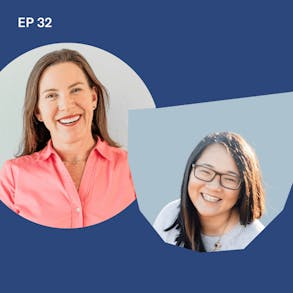
LISTEN TO THIS EPISODE
SHOW NOTES
EPISODE DESCRIPTION
#28: Postpartum depression affects many women, and estimates range from 1 in 10 to 1 in 5 women experience symptoms of postpartum depression. In this episode, first time mom Carissa Rose shares her story about postpartum depression following the birth of her son Ollie.
Carissa talks about how she struggled to conceive and suffered through a number of miscarriages before conceiving Ollie. Whereas she thought it would be smooth sailing once her son arrived, she recognized signs of serious depression 2 weeks after his birth.
In this episode Carissa opens up about her support system as well as how she dealt with and is dealing with postpartum depression. She shares with us how having a feeding plan for baby-led weaning helped her feel successful in an aspect of motherhood that she was previously apprehensive about: starting solid foods.
SUMMARY of episode
In this episode, guest Carissa Rose talked to Katie about:
Her individual experience with postpartum depression, her support group, interventions she decided on and how she is managing her health now that her son is 14 months old
How having a blueprint plan for introducing new foods to her son Ollie helped Carissa feel a sense of accomplishment and success she had not previously experienced as a mother
LINKS from episode
Check out Carissa’s 100 First Foods instagram feed with her son Ollie @ollie.eats.world
If you want to join Katie’s 100 First Foods program Carissa was mentioning in the show, it is currently open for a limited-time enrollment
TRANSCRIPT of episode
WANT MORE BLW INFO?!
SUBSCRIBE to the Baby-Led Weaning Made Easy Podcast here - new episodes are released on Monday and Thursday and subscribing means you’ll never miss what’s new (+ you’ll get notified about special bonus episodes too!)
FOLLOW Katie’s baby-led weaning Instagram page @babyledweanteam for daily video trainings -
JOIN the 100 FIRST FOODS FIELD GUIDE taught by Katie Ferraro, MPH, RDN & Dawn Winkelmann, MS, CCC-SLP & push your baby’s palate to 100 foods before 1 too!
SIGN UP for Katie’s free online workshop “BABY-LED WEANING FOR BEGINNERS: How to get your baby to try 100 foods before turning 1 without you having to spoon-feed purees or buy pouches” - everyone on the free workshop gets a copy of the 100 FIRST FOODS LIST so you can focus on all of the foods your baby CAN eat

Latest Episodes
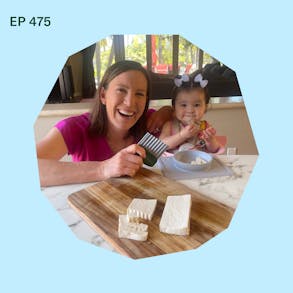
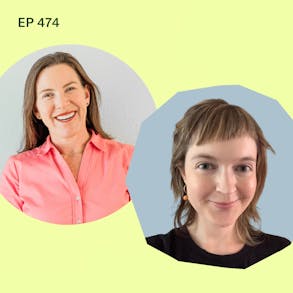
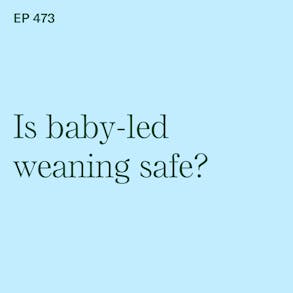
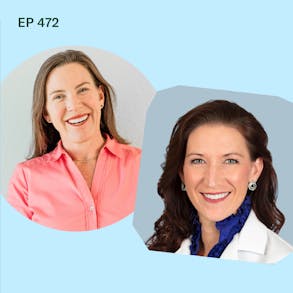

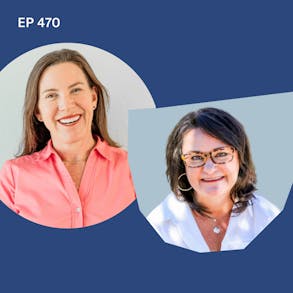
Carissa Rose (0s):
Definitely having like a meal plan and knowing what foods I wanted to serve him, it was our little bonding moment. And just watching him day by day, really helped me to just see him eating and progressing when so many things in the past, like didn't work out.
Katie Ferraro (16s):
Hey there, I'm Katie Ferraro, Registered Dietitian, college nutrition professor, and mama of seven specializing in baby led weaning. Here on the Baby-Led Weaning Made Easy podcast I help you strip out all of the noise and nonsense about feeding, leaving you with the competence and knowledge you need to give your baby a safe start to solid foods using baby led weaning. Hey guys. And welcome back to another episode of the baby led weaning made easy podcast. I'm your host, Katie Ferraro. I'm a registered dietician and mom of seven specializing in baby led weaning.
Katie Ferraro (56s):
And I've got a little bit of a different type of episode for you today. We are talking about something you don't generally hear associated with baby feeding and that's postpartum depression. Now I personally have not suffered from postpartum depression, but I have many friends who have, and someone who I'm actually pretty good friends with and had no idea she was suffering from postpartum depression. So my friend Carissa, who is a mom of an adorable 14 month old named Olie, has agreed to come on the podcast and she's going to share her story all about how having a plan for baby led weaning really helped her get over a difficult period in her life, which was when she was suffering from postpartum depression.
Katie Ferraro (1m 37s):
Now, in no way, are we saying that baby led weaning helped cure her postpartum depression? She's going to explain her journey, what she went through, how starting solids was something that kind of helped her during this period. And now having a plan helped her feel like she was succeeding in parenting and being a mother and taking care of her child. When she'll say in her own words, she was struggling in so many other areas. So I hope you guys like her story. One of the things I love about having this podcast is that it really is a great platform for sharing other people's stories because of course, no two moms or parents or caregivers are going to have the same experience. And especially with postpartum depression, we'll talk a little bit about the statistics inside of the episode and how nobody's journey mirrors, anyone else's yet we can learn and grow and also become more compassionate.
Katie Ferraro (2m 28s):
I feel like if we hear other people's stories, so I'm really thankful that Carissa agreed to come on the podcast and share her story. I think you guys will love what she has to say. And then also if you have a chance to go check out the show notes for this episode, I mentioned it a few times in the interview with Carissa BLW podcast.com/ 28, I'm going to link to her feeding account so you can see her own experiences of how she started solid foods using baby led weaning and my hundred first foods program with her son Ali. Again, doesn't work for everyone, but this was something that worked for her podcasts are great because you can hear what's going on. But if you want to see more of the visuals, you're going to want to check out some of the resources and references that we mentioned inside of this episode.
Katie Ferraro (3m 12s):
So hope you guys enjoy it. And with no further ado, I'm going to go ahead and link and loop Carissa in here to talk about postpartum depression and how having a plan for baby led weaning helped her in her particular case. Well, Hey there Karesa thank you so much for being on the podcast with me today.
Carissa Rose (3m 29s):
Yeah, no problem. Thanks for having me.
Katie Ferraro (3m 31s):
This is a little weird you guys cause Carissa and I live in the same town, San Diego, California, and we're actually friends in real life, but I only met her recently because I was introduced to Carissa when her son Olie started doing baby led weaning. I was following his feeding journey. He was doing my a hundred first foods program, but then we met in real life. It became friends as well, but I'd known Carissa for awhile before I discovered that she had suffered from postpartum depression. So she's here today to talk a little bit how having a baby led weaning plan helped her overcome and get through this challenging period after she had her son Ali. So Carissa, I want to go ahead and just dive right in. And as we know, postpartum depression is experienced by many mothers and I'm curious if you wouldn't mind just telling our audience a little bit about your experience with postpartum depression.
Carissa Rose (4m 20s):
Yeah. So to get to the postpartum depression part, I kind of have to backtrack a little so through trying to get pregnant with Ollie, my husband and I, we went through five losses and then, so that was really hard. And then every time I get pregnant, I have hyperemesis gravidarum, which is just extreme, nonstop all day long morning sickness. And so that was hard to go through. And then we had an emergency C-section with Olie. So that was like another hard thing. And it was just like, okay, like this baby is finally here. Like things are gonna stop being crazy. Ali is here. Like we're going to just have an amazing time moving forward now, you know, all that stuff's in the past.
Carissa Rose (5m 3s):
And then about two weeks into having Olie postpartum hits. And it was really hard because, you know, I thought that everything was done. I thought Olie was going to be, you know, like my little pot of gold at the end of the rainbow type of thing, but nothing really like prepped me for dealing with postpartum depression. I know a lot of it is like chemical imbalances, but I also think for me it was circumstantial, you know, going through all that I did in the past to like conceive and to get Ali and then just him. And he was a really hard baby at the beginning. He was very colicky.
Carissa Rose (5m 43s):
We had a hard time nursing, like with breastfeeding, any spent a week in the NICU right after he was born. So I think just things not going well for us, like really triggered postpartum depression.
Katie Ferraro (5m 58s):
Can I ask you a quick question? You mentioned two weeks, like I know very little about postpartum depression. I have seven children of my own. I, I did not experience it myself, but one thing I always remembered was like, you are going to your OB appointments. There was signs everywhere. Like basically the way I, what I walked away with was the first six weeks is pretty typical to experience what they call like the baby blues. But then if you're experiencing those feelings after six weeks is when you should consider, you know, evaluating whether you truly have postpartum depression and reaching out to someone who specializes in that. And I only remember that because I remember at like six weeks in one day with one of my baby or babies, my husband was like, you're, you're still feeling terrible. This is postpartum.
Katie Ferraro (6m 38s):
I saw those signs all over the doctor's office. And I was like, oh my gosh, is it really like it? You like flip a switch at six weeks, but you're saying at two weeks you recognize signs. Like how did you know to get diagnosed?
Carissa Rose (6m 49s):
So at two weeks is when I started getting signs and not to get too dark, you know, but like suicidal thoughts started coming and things like that, that weren't normal. Like baby blues signs. Like if you Google, you can Google like baby blues versus postpartum depression. And there are people that have made really great infographic charts and stuff about like what you're feeling. And so we just kept like a super close eye on it. And, you know, as the weeks went on, it got more and more severe and it wasn't letting up. And so, like you said, I do think around like the six week mark is actually when we went and got diagnosed, I talked to a therapist, I talked to my OB and we all, you know, decided that it was definitely postpartum depression and postpartum anxiety.
Katie Ferraro (7m 35s):
Recommend the therapists, like in what order does that go for other moms that might be experiencing too? Do you go to first, if you think there's real difference?
Carissa Rose (7m 41s):
Go to your OB first because they deal a lot with, you know, new mothers and stuff like that. So I went to my OB and she's, she's amazing. And she didn't judge me or anything. She was actually really like, glad that I was coming to her and talking to her about this because you know, a lot of people don't talk about postpartum, depression and stuff. And so I'm going to my OB and then she then decided to send me over to a psychiatrist, I guess. And they were able to get me the right medications from there.
Katie Ferraro (8m 14s):
The questions was, had you previously been on medication or was this all new to you and is this sort of stuff covered by insurance or is this something you have to pay for out of pocket? Cause that seems really overwhelming on top of having a newborn.
Carissa Rose (8m 24s):
Right. I had not been on any medications for depression or anything before this and thankfully we, we have insurance and so it was covered by our insurance. I'm not sure about other insurances, but you know, we just had to pay like a $20 copay. And then
Katie Ferraro (8m 41s):
Could you see a therapist regularly or was it like a one-time thing?
Carissa Rose (8m 44s):
We would see them regularly.
Katie Ferraro (8m 45s):
And was it you by yourself or your husband? Do you bring the baby?
Carissa Rose (8m 49s):
By myself.
Katie Ferraro (8m 51s):
Okay. So can you talk a little bit more about the support you received or may not have received this time? I mean, obviously it was speaking only to the level that you're comfortable with, but did you feel supported or did you feel isolated?
Carissa Rose (9m 2s):
I felt super supportive. So my husband had depression like in his college years. So his parents were just like super supportive. They knew the signs, they knew what to do and what to look out for and stuff because they experienced it with him. And so they were, they packed us up. Like they literally packed us up and moved us in with them for like two months in the thick of everything, just so you know, they could be helping with Ali around the clock and I could just sleep because the best thing to do, I feel like, and what a lot of other people have talked about with like depression and postpartum depression. Like you just want to sleep basically. Like that helps you heal. That's the last thing you can do when you have.
Carissa Rose (9m 43s):
Right. Exactly. And so I think having like my husband and my in-laws and us just living with them, that really helped me.
Katie Ferraro (9m 51s):
I've met her, his mother-in-law. She's amazing. She is so fabulous. Just was like, please come over.
Carissa Rose (9m 59s):
He really is. So I think that was like a really big saving grace. I think if we didn't have that support, I think fully have like amazing friends and you know, my own parents and stuff like that, but just having someone local, like really made a difference. And so if there are other people that are going through it, I would definitely recommend like reaching out and not being afraid to accept the help.
Katie Ferraro (10m 22s):
So you mentioned medication and I was just curious, is that something that they recommend you continue? Is it just to get through a hard time? Did you have like a support group of other moms who are going through the same thing and did any of this affect breastfeeding or like prior to solid foods or formula feeding, whatever you decided to do was any of that interconnected, like how the depression was maybe affecting feeding even prior to Ali starting solids?
Carissa Rose (10m 46s):
So with the medication and stuff, I'm still on it all Olie is 14 months old now, but it's just something that I want to continue taking until I kind of feel like I'm more out of the woods and it's, you know, recommended by my doctor as well, but with Ali and feeding and medication and dealing with all this. So back when Ali was born, he was terrible at latching. We tried every, everything possible, like SMS, which is like when you have like a
Katie Ferraro (11m 21s):
Yeah. It makes you feel Llike really terrible when they,
Carissa Rose (11m 25s):
Yeah. So it's like the tube and he can't even latch to the tube. And so that didn't work and then I'm trying to just pump exclusively through all of this was just too taxing on me. And so we decided about like three weeks, like when all he was like three or four weeks old to just totally just switch over to formula. And I never looked back from that, you know, like trying to pump and stay on top of like producing enough and it was just way too much for me. And so we went into formula and then from formula, we went into baby led weaning when he was six months old.
Katie Ferraro (12m 1s):
A little bit about baby led weaning. How did you know what baby led weaning was? Or did you stumble upon it? Had you had plans for feeding? Like give us a little bit of the background on where you're coming from with that.
Carissa Rose (12m 11s):
Yeah. So food is really important. I mean, to everybody, but me and my husband, we love food. We love cooking. Same with my in-laws. Like, we always go out to eat together. We just bond over food. And so I think with Olie, not doing well with breastfeeding, like, I kind of felt like a failure or just like, you know, I didn't fulfill what I was supposed to do for him. And so when he was moving on to solids, I wanted, I wanted to do things like quote unquote, right. You know, by skipping. So I used to nanny, and I remember just sitting there with the babies that I would nanny trying to spoonfeed them. And it taking forever and crying and tears, you know, like on both ends sometimes.
Katie Ferraro (12m 53s):
I don't want to feel like a failure part 2 to force feed a child, spoon when they're not ready to, or don't want to.
Carissa Rose (13m 1s):
Exactly. And so my best friend, she has a baby that's five months older than Olie. And she started baby led weaning by finding you on Instagram. And so she referred me to you and I saw your a hundred first foods program. I watched your live webinars, ask some questions in there. And it was like, okay, like, I'm doing this. We printed out your hundred first foods list, hung it on our fridge. And we were like, all right, let's just start checking things off. So the day Ali turned six months old, we just went for it. And yeah. So glad
Katie Ferraro (13m 33s):
Because I found you on Instagram really early in Olie's feeding journey. I think a lot of times moms will start a hundred first foods. And then they get to the halfway mark and start like tagging me and stuff. I'm like, that's awesome. That's great. But like other moms really want to see the first few days as well, because that can be the most challenging. And I was curious if like, was the postpartum, I don't want to say pretty well contained. Cause I know that's really hard to assess, but when you started solid foods, were you like I'm feeling good? Or we you're like frustrated because the first few days and weeks they don't eat that much. How are you feeling at the beginning? Like, like take yourself back to where you were when Olie turned six months old.
Carissa Rose (14m 9s):
Yeah. My husband will like a hundred percent be on board with what I'm about to say. It was hard in the beginning when we were starting baby led weaning. I had done all the research. I had hyped myself up, you know, to try to like get myself in a good Headspace. Like this is going to be an amazing project for me and Olie to do, like, we're going to be able to bond over food and all this stuff. And day one, I hand him some avocado and you know, he takes like a little taste of it and then like, doesn't want anything to do with it. And that like wrecked me so
Katie Ferraro (14m 41s):
Anticlimactic. Right. And parents do it like two times. And then they're like this isn't working, I'll just do a pouch. And it's like, you just have to remember that it takes some babies weeks, sometimes even up to two months before everything of clicks. So can you tell us if you remember a moment when you were like, oh, this is how it's working? Like how long did that take?
Carissa Rose (15m 1s):
About like four or five days in? We tried chicken with him and we did, you know, the whole method of like purees for a few days, like where we blended some with like some formula. And then we also had like a strip of chicken and he just went to town on it and it was like amazing to see him like eating both the pureed chicken and then the strip o chicken. And I think like, it kind of, I don't know, I can't speak for him, but like maybe clicked for
Katie Ferraro (15m 30s):
Him for himself.
Carissa Rose (15m 31s):
Like, oh, this is actually like, this tastes good. Like it's different than formula, but you know, I wanted to explore this some more. And so I think that was a really good day and a really good turning point because from then on he's like, honestly, he's been down to try, like anything that I put in front of him.
Katie Ferraro (15m 48s):
And if you guys are just starting out and you want to check out, Carissa did document all of this a hundred first foods on Instagram. So her feeding pages, Olie.eats.world, it's O L L I e.eats.world. And she did three posts for each of the hundred first foods. And I remember seeing your feed being like, oh my gosh, this is amazing because she's also a photographer. So it's like beautiful. But what I like is that you documented it from the beginning. Cause I feel like some people wait until their baby gets proficient with food. And then they're like, oh, look at all this food, my baby eats at the beginning, you were still like, here's us trying it, but he's not really eating that much. And I think seeing really is believing for parents and recognizing like, okay, they don't automatically wake up on their six-month birthday and know how to eat.
Katie Ferraro (16m 33s):
And then it takes a few weeks, sometimes even months for the baby to get into it. So her feed is really gorgeous and gives you a lot of ideas of the a hundred different foods and then some that babies can eat. So there's so many challenges that a lot of moms face when introducing solids. And it sounds like in a couple of days, all it kind of got the hang of baby led weaning. Also he's like the most adorable child in the world in real life and on Instagram. And for you, can you just remember like with the postpartum where you let's say month seven, when things are like starting to get jamming and he's like getting the hang of solid foods, how were you feeling personally, personally,
Carissa Rose (17m 12s):
Month seven. It was still touch and go, to be honest, you know, there were days where I would wake up and not want anything to do with him, which like hurts me to say, cause like you said, he's like the most adorable baby and like, why wouldn't I want to spend every waking moment with him.
Katie Ferraro (17m 27s):
Can I just say you do not have to have postpartum depression to sometimes feel that way by your children? Cause I feel you on that one. Exactly. But you're a good meal prepper. So I know you, you would like get all the food prepped and then your husband and your mother-in-law like you did have other people were helping to feed him, which I think was really cool as well. Right? Yeah.
Carissa Rose (17m 44s):
So definitely having like a meal plan and knowing what foods I wanted to serve him during the week, like really helped. It helped keep me balanced, gave me something to look forward to. And you know, it was like, it was our little bonding moment each day, like, okay, Olie, I'm going to sit you down and you're going to eat this plate of food and I'm going to shove a camera in your face. But it was, I dunno, just watching him day by day really helped me personally to feel better. Like it may not be that case for everybody, but it helped me to just see him actually like eating and progressing when so many things in the past, like didn't work out for us the way that I had hoped. How do
Katie Ferraro (18m 24s):
You feel that baby led weaning fit in with, let's say your family dynamic and traditions. I'm thinking like grandmothers, aunts, your husband, other family members. I mean, you are documenting this on social media, which, you know, people will give you their unsolicited. Totally put it out there. But I feel like, especially in the baby led weaning space, if you set the tone the right way that people are really supportive and they're there just to learn and observe what you're doing, but did it fit in with like the rest of your family life to do this approach to solids?
Carissa Rose (18m 53s):
Nope, not, no. My mother-in-law will be the first to say that she thought I was kind of crazy for like going about this way of feeding. I think, well, what she said is the name like baby led weaning. She didn't really understand like so bad,
Katie Ferraro (19m 8s):
But then it's kind of intriguing to people. They're like, Oh yeah. What is it that mean? Maybe it's.
Carissa Rose (19m 14s):
Yeah. And but now today she's like bragging to like all her siblings and family, like all, he's such an amazing eater. Like he ate like five servings of broccoli last night and he's eating shrimp like nobody's business, you know? And so it was definitely different for like my in-laws or even like my sister-in-laws who have like older kids or friends, you know, I got a lot of messages in the beginning. Like what are you doing? But over the course of the past, like eight months since we started or whatever, however long that is, everyone's come around. Like everyone's amazed. And everyone's so glad that I stuck with it.
Katie Ferraro (19m 51s):
Good for you for sticking it out because it can be hard if you're kind of the one sticking your neck out there, especially if other people don't understand. But I think that's kind of the power of social media. For example, like seeing really is believing like you were educated about minimizing choking risk. You had done a lot of education by taking courses and doing workshops. And I know we chatted a lot about baby led meaning at the beginning. So I think you did all the right things. And now look at him at 14 months of age, I'm actually just looking at your Instagram right now and I forgot about the eggplant day. So can you talk a little bit about if you guys go back in her feed there's a day where he has rashes all over his face. So tell me, remember you texted me that day. Cause it was like eggplant's kind of a random one to have a reaction to, but babies can have a reaction to anything.
Katie Ferraro (20m 32s):
So tell us a little bit about eggplant day.
Carissa Rose (20m 35s):
Yeah. So day 65, if you scroll down in my feed, it was eggplant day. I just roasted some eggplant and all the oil in the oven and gave it to him. And you know, he took a couple bites and he was like kind of feeling. And then I noticed he was like scratching his neck and pulling out his bib, which you like never did. And then he just like started like crying and freaking out. And I looked, I lifted up his chin and you can see in the pictures, he had this crazy rash, like on his cheeks and all under his chin and down his chest. And it was just all like inflamed and bumpy. And I like didn't know what to do at the moment.
Carissa Rose (21m 18s):
I didn't have any Benadryl, but I was just focusing on his breathing to see if it was getting labored or anything. No, it wasn't thankfully. So after about like 10 minutes, he was fine. Again, like the rash had subsided, but it was just super random and really scary in the moment. And to be honest, I haven't given him eggplant again, which I probably should, but yeah, exactly. So I think we'll try it again. You know, like, like everyone suggests with things like this, like repeated exposure is really important, but it was just really random, but I think any
Katie Ferraro (21m 58s):
Other allergies or, and that's definitely not a sign of a severe allergic reaction by any means, but did he have any other situations with food reactions that you were concerned about?
Carissa Rose (22m 8s):
We thought in the beginning that he was allergic to dairy, I think on yogurt day, I think that was like day six or seven or something like that. Like in the beginning we gave him yogurt. It was actually day three, whole milk yogurt. And I think we just gave him too much because that night he was like, yeah, he had like blood in his stool. He was like, not a happy camper. He was gassy. And so we talked to like our pediatrician and he was like, well, that doesn't make sense. Like the formula that you use has milk in it. So just like reintroduce it slowly. And he suggested like the, the dairy ladder.
Carissa Rose (22m 48s):
And so we kind of did that loosely and now he's fine with that, but it was mostly just the eggplant and everyone was like, it's an it's a night shade, vegetable or whatever. So maybe that's why, but who knows? So keep an
Katie Ferraro (23m 1s):
Eye out for moving forward for sure. But I like that it didn't deter you, you didn't pull out all the stops and go back to purees. Cause he'd had one day of a reaction.
Carissa Rose (23m 8s):
It was so funny that I told my pediatrician about it and he was like, eggplant, like that's a food that not a lot of one-year-olds are getting. And I'm like, well, cause he does it well. Would you like to see my Instagram?
Katie Ferraro (23m 27s):
Could tell a mom who's struggling with postpartum depression, if you had like one piece of advice, just based on your experience, obviously we're acknowledging that all peoples who have postpartum depression and it's one in 10 in the United States, so it's fairly common, but it manifests itself differently. What's the piece of advice that you would give to a mom struggling with postpartum?
Carissa Rose (23m 48s):
I think the important would be to talk about it and also accept help for it. It's hard, you know, to like open up to people, to tell them or admit that you have something like quote unquote, like wrong with you and stuff, but it's so important because you don't want to be battling this alone. So many scary things could happen. Like I had a really, really dark moment almost a year ago and I wouldn't have made it out of that without reaching out for the help and also accepting it. And so I think that's what I would definitely recommend. It's really hard. And there's like a lot of stigma that like that comes with like postpartum depression and postpartum anxiety, but you just got to blow right through that.
Carissa Rose (24m 35s):
You know, there's, there's so much more to you as a person and more postpartum depression than like what you feel like day in and day out, if that makes sense.
Katie Ferraro (24m 43s):
So one of the things that we were researching before this episode, because again, I'm a registered dietician specializing in baby led weaning, certainly not a postpartum specialist by any stretch of the imagination. But my dietetic intern, Sally was helping me with the prep for this interview. And so we were talking about like, is it possible to identify on average, how long does postpartum depression last? And she went through all the research and the answer is no, that if you look at the published research about it, it's anywhere from days to 24 months. But in one particular review study that we were looking at this, it looked at 23 longitudinal studies following moms after diagnosis of post-partum depression, there was indication that an estimated 30% of the moms in the whole community sample were affected by postpartum 50% in clinical samples continued to have major depression during their child's first year of life and even beyond.
Katie Ferraro (25m 37s):
So we really is something that some people recover from fully in a short period of time. Other moms may struggle with this on end, but as you mentioned, one in 10 women, roughly in the United States, this is a CDC statistic are affected by postpartum depression. So even if it's not you personally struggling with it, it could be someone who is very close to you and Chris, I can't thank you enough for sharing your experience and how you were able to kind of get over periods of darkness and feel like you were having small victories because you had a plan to feed Olie. And we have like all loved watching Olie. He like there's other moms that are like, we, you know, Olie's mom in real life. I was like, yes I do.
Katie Ferraro (26m 17s):
She's amazing. And, and watching and seeing that you, and to honest, I was really surprised because in real life you are such a bubbly, upbeat person. When you told me offline that you were struggling with postpartum, I was like, oh my gosh, like you can not judge a book by its cover. Like I had no idea and that we all do need to be sensitive to other people's journeys and struggles, even if it's not something they're willing to talk about. But I just want to say thank you so much for taking the time to talk about this really important subject for our audience here on the podcast. Well, cool. And you guys, again, if you want to check out Carissa's Instagram for Olie it's Olie.eats.world, I'll also link it up on the show notes for this episode. So if you go to BLW podcast.com/ 28, I'll link to some of Carissa's stuff as well.
Katie Ferraro (27m 1s):
Because again, she has taken the time to put all this out there on how her son ate a hundred first foods. So thank you for sharing him with us. Thank you for sharing your story with us. You are awesome. And it's been such a pleasure speaking with you today. Thank you so much. All right. Thanks. Bye now. So I hope you liked that episode with Carissa. I know it was a little bit heavy, a little bit different than what I normally do on the baby led weaning made easy podcast, but I think the topic is really important and I loved that. She was able to use having a plan for baby led weaning as a way to help her get through a really challenging time in her life. So in no way, implying that having a baby led weaning plan will cure everybody's postpartum depression, but I hope you heard what she said that it was the first time that she felt like she was successful in an aspect of mothering where she'd otherwise felt really frustrated and really dejected it.
Katie Ferraro (27m 52s):
And when she told me that, I just was like, you have to come on and tell your story. So thank you for listening to this episode. And if you guys are interested in learning more about the hundred first foods program that Carissa was referencing, that she did with her son Olie, that program, which is a digital program, I co-teach it with Dawnn Winklemann, who is a speech language pathologist and expert in pediatric swallowing. And baby led weaning. She and I have our digital program, the hundred first foods field guide open right now. So at the time of this recording, it's open for a very limited period of time. We take a small group of students a few times a year, and really work with them through the hundred different foods showing you how you can feed those foods safely.
Katie Ferraro (28m 38s):
So it's a whole digital program in plan alongside eight weeks of group coaching inside of a private group. So if you have any questions or you get stuck, Dawn and I are there to help walk you through that, that program. If you want to check it out, if you go to 101st foods.com, that's where you can find information about it. So check it out. If you are also interested in the a hundred first foods, and to those of you who are struggling with postpartum depression, I do hope that you are able to find resources, to find approaches, to find interventions among all the different ones that Carissa talked about. There's not a one size fits all approach for anyone when you're dealing with something this serious. And so I thank you for taking the time to listen to her story and to this episode.
Katie Ferraro (29m 20s):
And for those of you that are struggling, I hope that you can find a way to help yourself out of this challenging period as well. Bye now!
Get baby-led weaning recipes and tips delivered right to your email inbox.